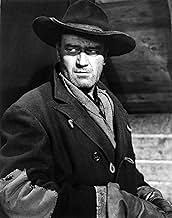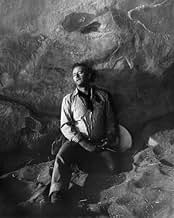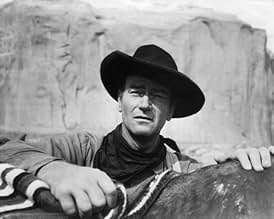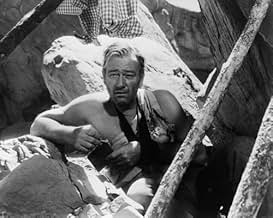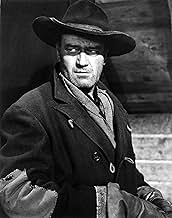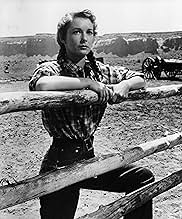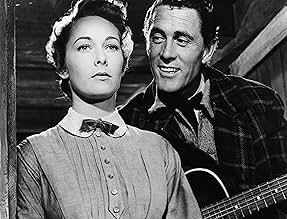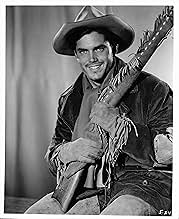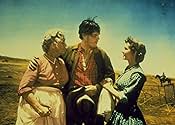Ethan Edwards é um veterano do exército confederado que odeia índios. Sua vida corre tranquila até ter sua família massacrada e a sobrinha raptada por Comanches. Ele parte então para sua mai... Ler tudoEthan Edwards é um veterano do exército confederado que odeia índios. Sua vida corre tranquila até ter sua família massacrada e a sobrinha raptada por Comanches. Ele parte então para sua maior batalha contra fome, frio e solidão no Oeste.Ethan Edwards é um veterano do exército confederado que odeia índios. Sua vida corre tranquila até ter sua família massacrada e a sobrinha raptada por Comanches. Ele parte então para sua maior batalha contra fome, frio e solidão no Oeste.
- Prêmios
- 4 vitórias e 4 indicações no total
Patrick Wayne
- Lt. Greenhill
- (as Pat Wayne)
- Direção
- Roteiristas
- Elenco e equipe completos
- Produção, bilheteria e muito mais no IMDbPro
Avaliações em destaque
John Ford and John Wayne re-team for their best and most famous western. Wayne plays returning Civil War veteran Ethan Edwards, who comes to the Texas ranch of his brother on hopes of settling down to a new life. Unfortunately, these plans are cruelly thwarted when the ranch(filled with the women and children) is raided by ruthless and renegade Indian chief Scar, who attacks and massacres the family, except for little Debbie Edwards(Natalie Wood) Ethan, enraged and distraught by this raid, vows to track down and kill the tribe, and rescue his niece, with the help from his nephew Martin(played by Jeffrey Hunter). This search takes several years of their lives, across the country and through all kinds of weather and obstacles, until one day they finally locate Debbie, who is now assimilated into the tribe Ethan hates, and he may not be able to spare her...
Gorgeously filmed on location in Ford's beloved Monument Valley, with an intelligent and ambitious script and a superlative performance by Wayne, as a driven and vengeful man who is not always likable, but is still righteous and fascinating. Film does ramble a bit, and the outcome is not really in doubt, but excellent film is still worth watching, with an astonishing closing scene.
Gorgeously filmed on location in Ford's beloved Monument Valley, with an intelligent and ambitious script and a superlative performance by Wayne, as a driven and vengeful man who is not always likable, but is still righteous and fascinating. Film does ramble a bit, and the outcome is not really in doubt, but excellent film is still worth watching, with an astonishing closing scene.
A second look at this film is long overdue. It's been hailed by many as a masterpiece. Even the anti-Ford critic David Thomson in The New Biographical Dictionary of Film classifies it as an exceptional work. I don't know whether it's the Ford mystique, the Wayne icon, or the mesmerizing beauty of Monument Valley that holds this movie to a different standard from most Westerns. But something is at work that numbs a critical eye-level inquiry. The Searchers is a good film, but no masterpiece, and certainly does not belong in the American Film Institute's list of top 100 films of all time. A brief look at some of the more obvious defects:
Ford makes picture postcards out of the soaring spires and buttes. At no point, however, does he come to grips with the real harshness of the terrain. This is desert country. Hardly anything grows-- just look at the sparseness of greenery. Yet we're told cattle herds feed here in large enough numbers to support families, (In the movie, Jorgensen's right-- they would be better off raising pigs than cattle). Then too, there is absolutely no hint of the desert heat or cold affecting anything or anybody. The parties go here and there with slim regard for what the conditions actually afford. In short, the celebrated landscape amounts to little more than a majestic backdrop without a true reality of its own. Ford may love this Spartan terrain, but he gives it scant respect.
Similarly, the film-maker undercuts the naturalism of the vaunted visuals. The audience gets an awesome flow of natural wonders, only to have the flow interrupted by outdoor sets so painfully obvious, they can't be ignored, (consider the Futterman ambush scene, for one). As a result, visual continuity is sacrificed and so is fidelity to the intended atmosphere. Suddenly we're jolted out of the scenic spell back into recognition that this is, after all, only a movie. Where, one wonders, was Ford's very real poetic eye in these disruptive scenes, and why didn't he insist on shooting all outdoor scenes outdoors-- especially after traveling to Colorado for the great snow scenes. As a premier film-maker, I'm sure he had the clout. Nonetheless, the lapse is another glaring defect.
There's another problem with respect, this time for the adversary. In fact, the Indians do get some concessions--Scar is provided a moment of motivation and a good sarcastic aside-- but not much else. As in Ford's cavalry cycle, aboriginal peoples still exist as convenient devices and sitting ducks. From the film's several battles, it seems the Indians know nothing about combat tactics. Stupidly, they never attack unless an escape route is left open to the fleeing settlers. And when they attack frontally across the river or in front of the cave, they mass in a bunch so the dug-in whites can hardly miss. No wonder there are so few Indians left. In most Westerns, this cliché would not even merit comment, but remember this one's supposed to be a "masterpiece".(For a gauge of Ford's dishonesty, compare his cardboard warriors with the skilled and savvy combatants in the similarly themed "Ulzana's Raid" {1973}).
For what is required of the actors, contrast the first ten minutes with the movie's remainder. Those first few minutes are little short of superb. There's a low-key naturalism and subtlety that's fascinating-- Just who is Ethan Edwards? What is the tension between his brother and him? And where did he get that impressive war medal? The well-crafted impression is that of real people concealing true feelings, while groping toward some kind of reconciliation across unspoken barriers. Then Ward Bond and the posse arrive and slam-bang stereotypes take over. The promising beginning is lost, while Ford reverts to form by replacing character with caricature. Bond, for example, stands not just as a gruff old man, but as The Gruff Old Man; Jeffrey Hunter is not just a callow youth, but The Callow Youth; and most egregiously, Ken Curtis is not merely one more country yokel, but The Rub-your-Nose-In-It Country Yokel. Moreover, conversation ceases, hat-throwing and shouting take over, and genuine interaction gives way to exaggerated personalities doing little more than bouncing off one another. Even Wayne's one-note avenger comes close to parody, (unlike others, however, he is never mocked). Of course, such caricatures provide ample grist for Ford's broad idea of humor. Nonetheless, the comic set-ups come perilously close at times to a Three Stooges level, particularly the scenes with Old Mose, and with Bond and Patrick Wayne. I'm not against comic relief, but I am when it flirts with burlesque in an otherwise serious film.
More could be pointed out, such as the distracting subplots, or the ludicrous wedding sequence, or most glaringly, the climax with its sudden, unmotivated change of heart-- after all, it's the racial conflict that drives the plot. I guess what really bothers me is how blithely Ford substitutes his own highly simplistic vision of the Old West for any really plausible version. There's a basic lack of respect for the material, which allows, for example, such facile touches as Jorgensen's unweathered two-story wooden house in the middle of the desert, or Vera Miles' brocaded form-fitting wedding gown that appears to have been flown in from Paris. My point is not that the film lacks merit-- the justly celebrated doorway shots, for example. Rather, it's one of perspective-- this is an entertaining film but far from a masterpiece.The Searchers may be lauded and popular with many. Nonetheless, beneath the glossy surface lies an under-developed theme that really deserved better than standard stock company treatment. In short, Thomson is wrong. The Searchers is not an exception to Ford's usual product. Rather, it's just a little less compromised.
Ford makes picture postcards out of the soaring spires and buttes. At no point, however, does he come to grips with the real harshness of the terrain. This is desert country. Hardly anything grows-- just look at the sparseness of greenery. Yet we're told cattle herds feed here in large enough numbers to support families, (In the movie, Jorgensen's right-- they would be better off raising pigs than cattle). Then too, there is absolutely no hint of the desert heat or cold affecting anything or anybody. The parties go here and there with slim regard for what the conditions actually afford. In short, the celebrated landscape amounts to little more than a majestic backdrop without a true reality of its own. Ford may love this Spartan terrain, but he gives it scant respect.
Similarly, the film-maker undercuts the naturalism of the vaunted visuals. The audience gets an awesome flow of natural wonders, only to have the flow interrupted by outdoor sets so painfully obvious, they can't be ignored, (consider the Futterman ambush scene, for one). As a result, visual continuity is sacrificed and so is fidelity to the intended atmosphere. Suddenly we're jolted out of the scenic spell back into recognition that this is, after all, only a movie. Where, one wonders, was Ford's very real poetic eye in these disruptive scenes, and why didn't he insist on shooting all outdoor scenes outdoors-- especially after traveling to Colorado for the great snow scenes. As a premier film-maker, I'm sure he had the clout. Nonetheless, the lapse is another glaring defect.
There's another problem with respect, this time for the adversary. In fact, the Indians do get some concessions--Scar is provided a moment of motivation and a good sarcastic aside-- but not much else. As in Ford's cavalry cycle, aboriginal peoples still exist as convenient devices and sitting ducks. From the film's several battles, it seems the Indians know nothing about combat tactics. Stupidly, they never attack unless an escape route is left open to the fleeing settlers. And when they attack frontally across the river or in front of the cave, they mass in a bunch so the dug-in whites can hardly miss. No wonder there are so few Indians left. In most Westerns, this cliché would not even merit comment, but remember this one's supposed to be a "masterpiece".(For a gauge of Ford's dishonesty, compare his cardboard warriors with the skilled and savvy combatants in the similarly themed "Ulzana's Raid" {1973}).
For what is required of the actors, contrast the first ten minutes with the movie's remainder. Those first few minutes are little short of superb. There's a low-key naturalism and subtlety that's fascinating-- Just who is Ethan Edwards? What is the tension between his brother and him? And where did he get that impressive war medal? The well-crafted impression is that of real people concealing true feelings, while groping toward some kind of reconciliation across unspoken barriers. Then Ward Bond and the posse arrive and slam-bang stereotypes take over. The promising beginning is lost, while Ford reverts to form by replacing character with caricature. Bond, for example, stands not just as a gruff old man, but as The Gruff Old Man; Jeffrey Hunter is not just a callow youth, but The Callow Youth; and most egregiously, Ken Curtis is not merely one more country yokel, but The Rub-your-Nose-In-It Country Yokel. Moreover, conversation ceases, hat-throwing and shouting take over, and genuine interaction gives way to exaggerated personalities doing little more than bouncing off one another. Even Wayne's one-note avenger comes close to parody, (unlike others, however, he is never mocked). Of course, such caricatures provide ample grist for Ford's broad idea of humor. Nonetheless, the comic set-ups come perilously close at times to a Three Stooges level, particularly the scenes with Old Mose, and with Bond and Patrick Wayne. I'm not against comic relief, but I am when it flirts with burlesque in an otherwise serious film.
More could be pointed out, such as the distracting subplots, or the ludicrous wedding sequence, or most glaringly, the climax with its sudden, unmotivated change of heart-- after all, it's the racial conflict that drives the plot. I guess what really bothers me is how blithely Ford substitutes his own highly simplistic vision of the Old West for any really plausible version. There's a basic lack of respect for the material, which allows, for example, such facile touches as Jorgensen's unweathered two-story wooden house in the middle of the desert, or Vera Miles' brocaded form-fitting wedding gown that appears to have been flown in from Paris. My point is not that the film lacks merit-- the justly celebrated doorway shots, for example. Rather, it's one of perspective-- this is an entertaining film but far from a masterpiece.The Searchers may be lauded and popular with many. Nonetheless, beneath the glossy surface lies an under-developed theme that really deserved better than standard stock company treatment. In short, Thomson is wrong. The Searchers is not an exception to Ford's usual product. Rather, it's just a little less compromised.
The best western ever made is how many regard this 1956 John Ford classic. Its star John Wayne gave his most winning performance and it is reputed to have been his favourite movie even to the extent of his naming his last born son Ethan after the character he played. Ford's beloved Monument Valley in Arizona never looked more spectacular in Vista Vision and colour and over the years the picture has gained cult status. An integral part of the combined elements that makes THE SEARCHERS great is Max Steiner's outstanding score. It is the picture's driving force - its backbone. Steiner's music propels the film forward, unifies the narrative and gives greater density to its key scenes. In fact without his music much of the picture's impact would be considerably diminished. Yet I am consistently amazed and at a total loss to see here on these pages - where the best part of 400 reviews appear - that Steiner's music is hardly referred to at all by any of the writers. Not only that but even on the extras of the last DVD release three well established film directors, Martin Scorsese, John Milius and Peter Bogdanovitch each speak glowingly of Ford's masterpiece but fail to mention Steiner's exceptional contribution. Bogdanovitch, at one stage, briefly mentions the music and how good it is but never puts a name on its composer. I find this not only doctrinaire but quite bizarre that these three men, who you would imagine should know better, would have such a detached attitude concerning one of the most perfectly conceived scores for a motion picture. Therefore I will attempt here to amend this anomaly and the afore mentioned omissions and give some deserving credence to Max Steiner's exceptional music for THE SEARCHERS which has well earned its place in the history of cinema.
A veritable orchestral explosion opens the picture in the form of a fanfare over the Warner Bros. logo. As the credits roll we hear the haunting Stan Jones ballad "Song Of The Searchers" wonderfully rendered by Ford favourites The Sons Of the Pioneers. The composer later interpolates this song into his score as the theme for the racist protagonist Ethan Edwards (Wayne). Then a lovely version - scored for guitar, solo trumpet and strings - of the traditional ballad "Lorena" plays under Ford's evocative 'frame within a frame' opening scene as the door of a remote homestead opens to reveal an approaching rider. It then skillfully segues into "Bonnie Blue Flag" to point up the rider's confederate allegiance. The "Lorena" ballad later becomes the family theme and is especially effective on solo violin for the scene where Ethan gives the young Debbie his wartime medal as her "gold locket" ("Oh, let her have it - it doesn't amount to much" declares Ethan somberly). And later it is arrestingly heard on spinet as Ethan bids farewell to the family and rides out with the posse to begin what effectively will be his great search. But where the score really shines is in the powerful music for the Indian sequences. Here there is a palpable authenticity in the scoring. Aided by the clever orchestrations of Murrey Cutter and some virtuoso playing by the Warner Bros. orchestra (particularly in the percussion section) Steiner fires on all cylinders adding realism, pathos and a sense of foreboding. There are echoes of the composer's "King Kong" (1933) in the cue for the scene where the Indians surround the posse and the music becomes rhythmically savage for the charge at the river and for the attack on the Indian camp near the finale. The composer's celebrated "Indian Idyll" (which he originally wrote five years earlier for the Burt Lancaster picture "Jim Thorpe-All American") comes into play and can be heard to splendid effect in the Indian camp sequences and as the motif for Look, Martin's (Jeffrey Hunter) new Indian "wife". Hearing these cues one can't help but wonder how remarkable it is that this most romantic of film composers - steeped in the musical tradition of late 19th century Vienna - his birthplace - should be so ethnically proficient at musically depicting the native American. More akin to what we have come to expect from this composer are lovely cues such as the sprightly theme for Martin and the lush and sweeping music for Martin and Laurie (Vere Miles). The score - and the movie - ends just like it began with "The Song Of The Searchers" playing as Ethan and Martin finally bring Debbie home and conclusively the door of a homestead closes on Ethan where a brief fortissimo quotation from that explosive fanfare closes the picture.
Alongside the great film music works of Miklos Rozsa, Alfred Newman, Dimitri Tiomkin and others Max Steiner's music for THE SEARCHERS stands head high as one the finest scores ever written for one the finest films ever made and as such should, and must, be alluded to in any dissertation or essay on the film.
A veritable orchestral explosion opens the picture in the form of a fanfare over the Warner Bros. logo. As the credits roll we hear the haunting Stan Jones ballad "Song Of The Searchers" wonderfully rendered by Ford favourites The Sons Of the Pioneers. The composer later interpolates this song into his score as the theme for the racist protagonist Ethan Edwards (Wayne). Then a lovely version - scored for guitar, solo trumpet and strings - of the traditional ballad "Lorena" plays under Ford's evocative 'frame within a frame' opening scene as the door of a remote homestead opens to reveal an approaching rider. It then skillfully segues into "Bonnie Blue Flag" to point up the rider's confederate allegiance. The "Lorena" ballad later becomes the family theme and is especially effective on solo violin for the scene where Ethan gives the young Debbie his wartime medal as her "gold locket" ("Oh, let her have it - it doesn't amount to much" declares Ethan somberly). And later it is arrestingly heard on spinet as Ethan bids farewell to the family and rides out with the posse to begin what effectively will be his great search. But where the score really shines is in the powerful music for the Indian sequences. Here there is a palpable authenticity in the scoring. Aided by the clever orchestrations of Murrey Cutter and some virtuoso playing by the Warner Bros. orchestra (particularly in the percussion section) Steiner fires on all cylinders adding realism, pathos and a sense of foreboding. There are echoes of the composer's "King Kong" (1933) in the cue for the scene where the Indians surround the posse and the music becomes rhythmically savage for the charge at the river and for the attack on the Indian camp near the finale. The composer's celebrated "Indian Idyll" (which he originally wrote five years earlier for the Burt Lancaster picture "Jim Thorpe-All American") comes into play and can be heard to splendid effect in the Indian camp sequences and as the motif for Look, Martin's (Jeffrey Hunter) new Indian "wife". Hearing these cues one can't help but wonder how remarkable it is that this most romantic of film composers - steeped in the musical tradition of late 19th century Vienna - his birthplace - should be so ethnically proficient at musically depicting the native American. More akin to what we have come to expect from this composer are lovely cues such as the sprightly theme for Martin and the lush and sweeping music for Martin and Laurie (Vere Miles). The score - and the movie - ends just like it began with "The Song Of The Searchers" playing as Ethan and Martin finally bring Debbie home and conclusively the door of a homestead closes on Ethan where a brief fortissimo quotation from that explosive fanfare closes the picture.
Alongside the great film music works of Miklos Rozsa, Alfred Newman, Dimitri Tiomkin and others Max Steiner's music for THE SEARCHERS stands head high as one the finest scores ever written for one the finest films ever made and as such should, and must, be alluded to in any dissertation or essay on the film.
If there is only one western that you must see from John Ford, I would say it is this one; though THE MAN WHO SHOT LIBERTY VALENCE is also absolutely unique, outstanding too. The element that makes those two films so stunning is not only the directing but the plot. This scheme was never made before and rarely copied since. Of course THE SEARCHERS plot will more or less inspire THE PROFESSIONALS, one decade later, from director Richard Brooks; just the overall scheme and especially ending, moral. The settings, landscape, music, acting, characters, everything is jawdropping and provokes emotion for anyone sensitive enough to feel all the power of this terrififc western. John Wayne gives his best performance, even better than in WAKE OF THE RED WITCH. One of the greatest ending ever.
A John Ford masterwork that's rich and spacious, just like the gorgeous western countryside that splashes every backdrop. John Wayne plays a flawed centerpiece, a grizzled former soldier with a chip on his shoulder and a strange, conflicted relationship with his extended family. As usual, cool confidence and raw masculinity seep from his pores and he takes hold of each scene with a pair of strong, old cowherder's hands. This is a film that rewards an active imagination, as there's much going on between the lines that, without being spelled out, brands the cast with an unusual level of depth and detail. Unspoken histories flesh out most every character, allowing even generic walk-ons to mosey into the picture at most any moment and cast ripples throughout the entire tapestry. It can be slow at times, and the casting of a very obviously non-native actor to lead the stereotypical enemy Comanche tribe doesn't sit well, but both such faults can be generally chalked up to the dated eccentricities of that era. Take the time to soak it all in, to look deeper than the superficial story, and you'll find a wealth of spoils.
Você sabia?
- CuriosidadesBeulah Archuletta (Look) was found crying in one of the tipis by John Wayne in between shooting scenes. When Wayne asked her why she was crying, she responded that she was going to miss her son's wedding because she was filming her scenes at the time. Wayne stopped production of the film for a few days and flew her to California so that she could attend the wedding.
- Erros de gravaçãoThe "dead" Indian under the rock, when the rock is removed, is clearly breathing.
- Cenas durante ou pós-créditosThe credits state this Warner Brothers film is in VistaVision; this may be the only Warner film in VistaVision.
- ConexõesEdited into Histoire(s) du cinéma: Fatale beauté (1994)
- Trilhas sonorasThe Searchers (Main Theme)
Composed by Max Steiner
Lyrics by Stan Jones
Sung by Sons of the Pioneers (uncredited)
Principais escolhas
Faça login para avaliar e ver a lista de recomendações personalizadas
Detalhes
Bilheteria
- Orçamento
- US$ 3.750.000 (estimativa)
- Faturamento bruto mundial
- US$ 1.071
- Tempo de duração
- 1 h 59 min(119 min)
Contribua para esta página
Sugerir uma alteração ou adicionar conteúdo ausente





